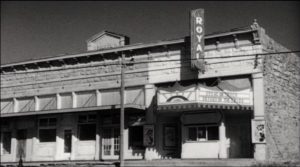Duane’s Denouement
From the Tampa Bay Times, 2007

It’s been about 10 years, so maybe it’s time to check in on our buddy Duane. You remember Duane Moore, right? We met him as a kid, first as a high school football star then as a roughneck, in The Last Picture Show. Time passed and he showed up in Texasville and Duane’s Depressed as a well-to-do oilman in the new Texas at the end of the 20th Century.
Here it is 2007, and Duane’s still with us in When the Light Goes. Karla, his wife of 40 years, died two years back and Duane’s turned kind of moody. His daughters don’t seem to know what to do with him now that he’s taken to riding his bicycle everywhere and doing funny stuff, like going off to Egypt on a freighter, just because he wanted to see the pyramids before he died.

Duane’s not depressed, exactly. He’s just befuddled by what’s happening to all of his friends and his beloved small town, Thalia. His kids have moved off and abandoned the family home. Hell, Duane doesn’t even stay in the big house any more, but instead hangs out at his primitive cabin on his fishing pond. Most nights, he sleeps outside because it’s cooler than his cabin.
He’s turned over the business to his coke-head son Dickie, who surprised everyone by cleaning up his act and kicking the drugs for good. Dickie moved the business to Wichita Falls and his sisters have settled into lives as wealthy bisexuals in North Dallas.

Author Larry McMurtry knows his character well and presents a man who refuses to get upset with all of the changes thrown his way. Nothing surprises Duane anymore. Life has been one ridiculous catastrophe and now all he can do is sit back and see how it ends.
When McMurty introduced Duane – and Sonny Crawford, Ruth Popper, Jacy Farrow and the whole cast of The Last Picture Show in 1966 – I thought he had created a Greek tragedy in the North Texas plains. Re-reading that first book years later, I realized it was hilarious. Funny, the perspective you get when you get older.
Texasville, the first surprise sequel, came along in 1986 and moved Duane to center stage and Sonny, who had dominated Picture Show, was relegated to the supporting cast. With the years, Duane has become the more interesting character and a good window through which to see the changes of modern Texas. Duane’s Depressed was hyped as the last volume in the trilogy, but McMurty has become awfully prolific in his sunset years. In the decade since Duane’s Depressed, he’s published 17 books and won an Oscar for his Brokeback Mountain screenplay.
Duane’s Depressed was a great setup for When the Light Goes, which is a novella-length denouement for Duane. When you invest 40 years of your reading life into such a likeable character, you want to know how things turn out.

And it’s fairly easy to see that Duane is somehow going to land in a field of yellow daisies. After years of therapy and obsession with his sexy psychiatrist, Honor Carmichael, things finally heat up between the two of them, which sometimes makes that un-air-conditioned cabin downright unlivable. This is the part of the book that could earn it a “strong sexual content” sticker. Since Carmichael has always kept a professional distance from Duane, you expect this to continue. When she changes her mind, it blindsides us – and Duane, who has some difficulty rising to the occasion.
What’s that they say about getting what you wished for?
Then there’s Annie Cameron, the geologist Dickie hired to run the Thalia office. Duane is instantly smitten on the first page of the book – hell, the girl is the same age as his granddaughters – but somehow we know that this relationship might rise above the May-December cliché or the dirty-old-man fantasy. Annie holds some surprises too and their relationship develops an innocent eroticism.
When Duane gets some bad health news – and learns that the next ribeye he eats may cause his death – he starts to tote up his reasons for living. Doing so, he makes us take a look at our ledgers as well.
McMurty can be hit and miss. Lonesome Dove, his Pulitzer winner, will probably make the first sentence of his New York Times obituary. That book and its sequels have some of his best writing on 19th Century Texas. But some of his other historical books fall flat. He’s at his best writing about Texas in the late 20th Century and the small-town way of life that is largely extinct.
When I first met Duane all those decades ago, I noticed that McMurty inscribed his book this way: “The Last Picture Show is lovingly dedicated to my home town.” At the time, I thought it was snide. With the wisdom of age, I understand that it was heartfelt.
